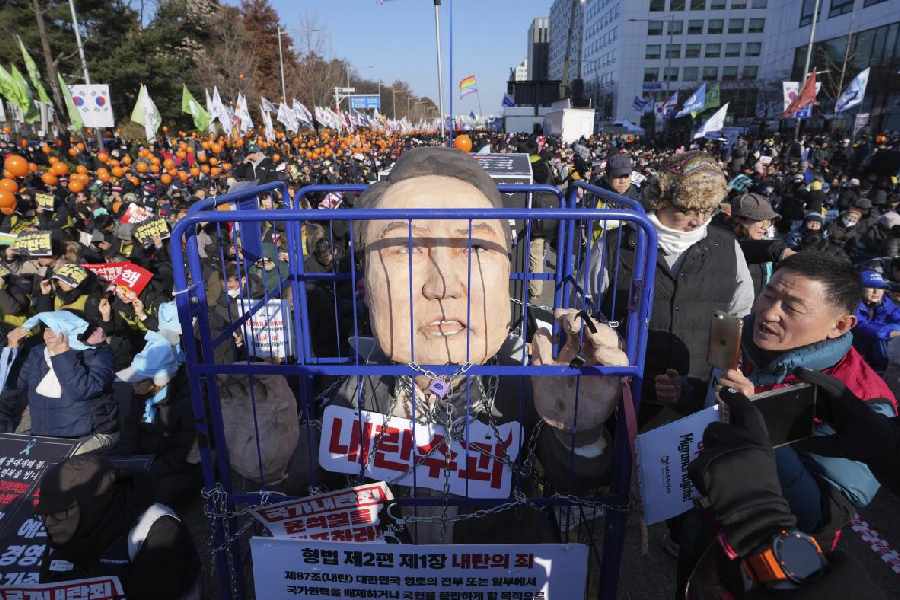South Korea’s National Assembly voted to impeach President Yoon Suk Yeol on Saturday, suspending him from office after his stunning declaration of martial law earlier this month caused widespread outrage and plunged the country into a constitutional crisis.
With the impeachment vote, Yoon has been suspended from office. Under South Korea’s Constitution, Prime Minister Han Duck-soo will step in as interim leader.
“This is a victory for the South Korean people and democracy,” Park Chan-dae, the Opposition floor leader said at a news conference.
The National Assembly passed the motion 204-85 in a floor vote.
Yoon repeated his intention to fight the impeachment in the Constitutional Court, which will now decide whether to reinstate or formally remove him, a process that could take up to six months. “I will never give up,” he said in a televised address shortly after the vote.
“Holding in my heart all the criticism, encouragement, and support directed at me, I will do my best for the country until the very last moment,” he said. It was the second National Assembly vote on Yoon’s impeachment motion.
Last Saturday, Yoon survived an impeachment vote after most ruling party lawmakers boycotted the floor vote. Some People Power Party lawmakers had since announced their intentions to vote for Yoon’s impeachment in a second vote, as public protests against Yoon intensified and his approval rating plummeted.
National Assembly Speaker Woo Won Shik said Yoon’s impeachment was an outcome driven by “the people’s ardent desire for democracy, courage and dedication”.
Inside the National Assembly, there were loud cheers and gasps from lawmakers when the Speaker announced that the votes in favour of impeachment had crossed the 200 needed to pass. The result indicated that 12 lawmakers from Yoon’s party had joined the Opposition to impeach him.
Hundreds of thousands of people gathered near the parliament and roared in jubilation, waved banners and brandished colourful K-pop glow sticks, as a lead activist shouted on stage: “We have preserved the constitutional order!”
“I’m over the moon, but this cannot happen again,” said An Jung-hyun, 26, who as a high school student joined protests against President Park Geun-hye, who was impeached in 2017.
Opposition leader Lee Jae-myung, addressing the crowd, noted that their fight was not over. “We’ve only just overcome a small mountain,” Lee said. “There is a larger, steeper mountain ahead.”
Yoon declared martial law on December 3, accusing the Opposition of paralysing his government, and soldiers were sent to the National Assembly. Lawmakers managed to vote down the declaration, however, prompting Yoon to rescind his order within hours.
It was the first time a South Korean President had declared martial law since the military dictatorship ended in the country in the late 1980s.
The impeachment was the latest twist in a turbulent term that began in 2022 when Yoon narrowly won the election on a conservative, business-friendly platform. His tenure has been marked by near-constant protests and political deadlock.
Opposition parties and many experts accuse Yoon of rebellion, citing a law that categorises rebellion as the staging of a riot against established state authorities to undermine the constitution. They also say that a President in South Korea is allowed to declare martial law only during wartime or similar emergencies and has no right to suspend parliament’s operations even under martial law.
The impeachment motion alleged that Yoon “committed rebellion that hurts peace in the Republic of Korea by staging a series of riots”.
It said Yoon’s mobilisation of military and police forces threatened the National Assembly and the public and that his martial law decree was aimed at disturbing the Constitution.
In a fiery speech on Thursday, Yoon had rejected the rebellion charges, calling his order an act of governance. The conservative Yoon said he aimed to issue a warning to the main liberal Opposition Democratic Party, calling it “a monster” and “anti-state forces” that he argued has flexed its legislative muscle to impeach top officials and undermine the government’s budget bill for next year. He claimed the deployment of troops was meant to maintain order, rather than disrupt it.
Democratic Party leader Lee Jae-myung called Yoon’s speech a “mad declaration of war” against his own people.
Observers say Yoon’s speech suggested a focus on legal preparations to defend his martial law decree at the Constitutional Court, even as opinion surveys showed more than 70 per cent of South Koreans supported his impeachment.
AP and New York Times News Service











